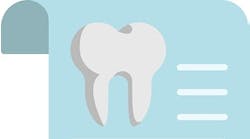Question:
I want to absorb a local practice. I will be purchasing patients and hiring the staff, but I will not be purchasing any of the seller's equipment or office space. How does this affect the evaluation of the seller's practice?
Tom Snyder, DMD, MBA
Obviously, the valuation for this practice will be considerably lower than if you were buying the entire practice. It is important to understand that practice values consist of two asset classes: tangible assets and intangible assets. Tangible assets consist of dental equipment, technology, inventory, and-sometimes-leasehold improvements. Intangible assets are what you cannot see or touch and are predominately classified as goodwill.
In fact, one of the valuation methods that we use is called the net asset method. This method considers the market value of the tangible assets as well as market value of the intangible assets. Since tangible assets are not involved in your valuation, only the intangible assets should be valued. We subscribe to a nationwide database that compiles transaction data from brokers and valuators across the country. It registers the goodwill allocation of the practice sales transactions as a percentage of most recent year's gross receipts. This data is then aggregated by location so you can get a more precise value. This goodwill ratio generally varies between 30% and 55% of the most recent year's receipts. However, it's important to note that this ratio can be higher or lower based on practice location.
Once you determine the value, the next decision you must make is whether or not to pay cash for the patient list. The fact that the staff is remaining is a positive point to ensure better patient retention and mitigate financial risk on your part if you pay all cash upfront for the patient list. If you are reluctant to pay all cash upfront, there are other methods that can be considered. First, you can pay a fee per patient record. That payment is only made if the patient visits your practice. Another method is to pay the seller a percentage of revenue that is generated by his or her patients for a two- or three-year period.
Wendy Hirai
Actually, it may not affect the price of the practice at all unless the seller is anxious to sell now and is willing to discount his or her sales price. The practice has presumably been valued by a competent broker who knows the values in your area and who has educated the seller that what he or she is really selling is goodwill and cash flow.
If the practice has been on the market for a long time, the seller may consider a reduced price for the charts only, especially if he or she is assured that the staff would be able to keep their jobs that way. Most sellers express as much concern for their staffs as they do about their patients, so that may be a deciding factor.
We recently sold a practice where the facility and equipment were very old. The buyer owned a successful practice and had built a big, new building. Now he was looking for patients to fill it. He did not need or want the equipment, but he was willing to pay the asking price as long as the seller would associate back after closing to make sure the patients would transition to the new location. Not only did the merger increase production to help pay for the buyer's building, but it also kept another dentist from buying the practice and competing in an already saturated market. The buyer also got some tax benefit from the portion allocated to equipment. For all of these reasons, the buyer was happy to pay the asking price.
"Value" is in the eye of the beholder.
Tom Snyder, DMD, MBA, is the director of transition services for Henry Schein Professional Practice Transitions. He can be reached at (800) 988-5674 or [email protected].
Wendy Hirai is regional manager for Idaho and Montana and senior practice broker with ADS Transitions Northwest. She lives in Boise, Idaho, and can be reached at [email protected] or (888) 419-5590, ext. 208.





